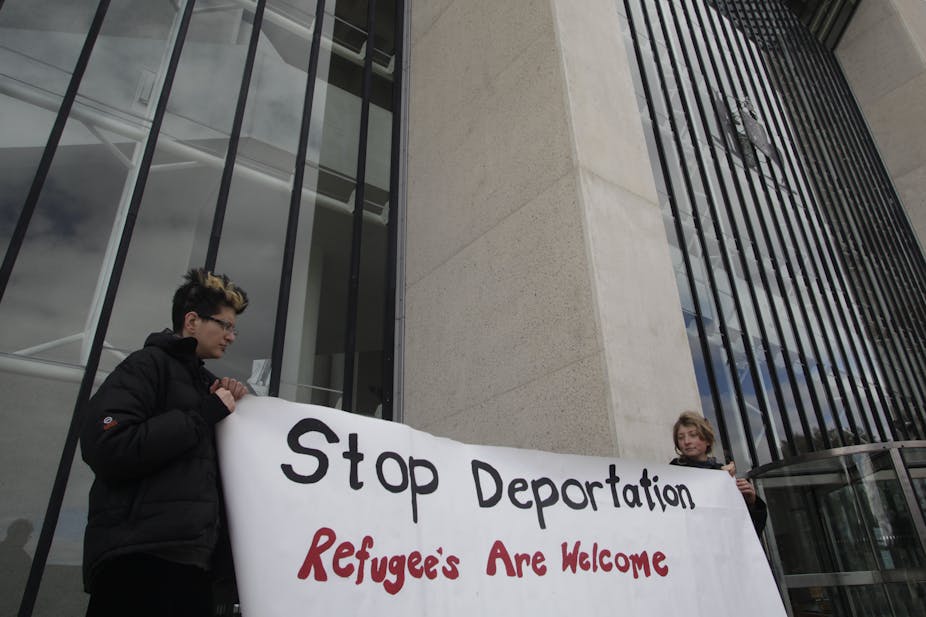The Gillard government’s refugee policy is in disarray after the full bench of the High Court today made permanent injunctions preventing the removal of asylum seekers to Malaysia.
The action was initially brought before the High Court by refugee activist lawyer David Manne, acting on behalf of clients who had arrived by boat and faced being removed to Malaysia, including a 16-year-old boy.
Under the terms of Malaysia Solution, Australia would have accepted 4000 people certified as refugees from Malaysia in return for the Asian country taking 800 asylum seekers who had arrived on Australian shores.
The Conversation spoke to Monash University legal expert Maria O'Sullivan about the implications of the decision.
Can you outline the grounds on which the High Court has made this decision?
The Section 198a Migration Act provisions mean that a country has to be legally bound to provide access for asylum seekers to effective procedures and to provide protection for asylum seekers.
A country like Malaysia has to be legally bound either under international law or its own domestic law to do those things [for the Malaysia Solution to be lawful].
Does this ruling mean the Malaysia Solution is dead?
Effectively yes unless two things happen. The government can seek to change Section 198a which was the section in question to lower the threshold in relation to human rights standards.
The government would obviously have to get that through parliament and I would say given the minority structure at the moment, the Gillard government doesn’t have a majority so it would have to get cross-bench support and that might be difficult.
Even though the High Court has said the basis of the Malaysia Solution is invalid, that is the declaration [made by Immigration Minister Chris Bowen], the government could get around it but would have some difficulty getting it through parliament.
If Malaysia did actually sign the 1951 Refugee Convention and was able to show that it is legally carrying out those obligations in practice then the Minister might be able to remake the declaration.
Does this decision also mean the end of taking asylum seekers offshore to any third country before their claims have been determined?
I would say so. I haven’t seen the full decisions of the judgement yet, the reasoning of the High Court.
Under the Malaysian agreement they were doing a cursory pre-removal assessment but it appears they have to see if someone is a refugee or not. It was argued by the plaintiffs that you had to look at whether the applicant had a well-founded fear of persecution before you transferred them.
So if you find that someone doesn’t have a well founded fear of persecution, in either Malaysia or their source country, then you can obviously remove them from Australia.
But in this instance those two asylum seekers did say they had a case about persecution, particularly in Malaysia, because they could have been caned or imprisoned or punished because they had committed an immigration offence or they could have been persecuted because of their religion.
Does the ruling also mean no more unaccompanied minors who arrive as asylum seekers will be removed?
Yes. The government had tried to argue before the High Court that the guardianship duties in Section 6 of the Guardianship Act were subjugated, [that is] they were less significant than the overarching public interest of transferring people under the Malaysia solution.
They were saying Section 198a, this very important section about declaring a country to be safe, overrode any guardianship duties the minister had over unaccompanied children.
What the High Court has said is that the Guardianship Act is very important. It says that an unaccompanied minor cannot be deported unless the Minister gives written consent. It means that when you are transferring unaccompanied minors, the minister must give his or her written consent.
Is the High Court court bringing us into line with our international obligations?
Yes. And you can’t just be released from your international obligations by simply transferring asylum seekers to a third country.
Government is still bound by the Migration Act, domestic law and our international obligations. You can’t transfer someone to a country which is not a party to the 1951 convention.

